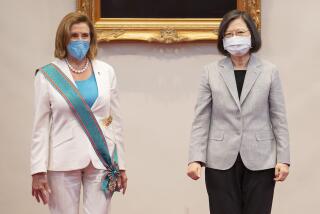Albright Plans Farewell China Trip
- Share via
BEIJING — Secretary of State Madeleine Albright will visit the Chinese capital, perhaps as soon as next week, in what is expected to be her final trip to Beijing as the top U.S. envoy, sources here said.
The agenda for Albright’s two-day tour, which appears to have been arranged at the eleventh hour, is still being hammered out. Neither government has announced the visit.
But the trip comes amid historic changes on the neighboring Korean peninsula and in China’s own five-decade rivalry with the island of Taiwan. And it presents Albright with the chance to make a valedictory tour of the world’s most populous country before the change in U.S. administration early next year.
Indeed, sources say Albright’s trip probably will be more about saying goodbye to Chinese officials she has come to know--her interlocutors in an often testy relationship--than about any diplomatic breakthroughs on issues ranging from a proposed U.S. missile defense system to human rights. Sino-U.S. ties remain edgy after a series of ups and downs over the past year.
The trip will be Albright’s fifth to mainland China since her appointment was confirmed in January 1997. Her last visit was in March 1999, two months before Sino-U.S. relations hit bottom when North Atlantic Treaty Organization warplanes bombed the Chinese Embassy in Belgrade during the alliance’s air war against Yugoslavia.
Likely topics of conversation in her meetings here include relations across the Taiwan Strait and this week’s groundbreaking summit between North and South Korea, which followed decades of bitter estrangement.
Washington has often cited the erratic behavior of North Korea as a rationale for working with China, which continues to exert some influence over the regime across its northeast border. North Korean leader Kim Jong Il suddenly surfaced in Beijing late last month for an unannounced tete-a-tete between the chiefs of the world’s biggest Communist nation and its most hard-line.
The Clinton administration wants to see North Korea reined in as a so-called rogue state with potential nuclear capabilities, while Beijing wants North Korea to develop a stronger economy. Recent widespread famine has pushed refugees from the North into China, an unwanted tide that authorities here are trying to turn with roundups and deportations. Amnesty International said Thursday that Beijing has forcibly returned hundreds of North Korean asylum-seekers in the past few months.
Both the U.S. and Chinese governments welcomed the Korean summit in Pyongyang, the North Korean capital.
“The Chinese side has heartily rejoiced over the success of the summit and wishes to extend its congratulations,” the Foreign Ministry said Thursday in a statement, calling the meeting “a major event of historical significance.”
In their talks with Albright, Chinese officials will probably raise the question of U.S. arms sales to Taiwan, including the recent sale of U.S. weapon systems designed to improve the capabilities of F-16 fighter jets bought by the island’s military.
The Chinese government also objected to this week’s visit by Transportation Secretary Rodney Slater to Taiwan, which Beijing considers a breakaway province.
More to Read
Sign up for Essential California
The most important California stories and recommendations in your inbox every morning.
You may occasionally receive promotional content from the Los Angeles Times.














